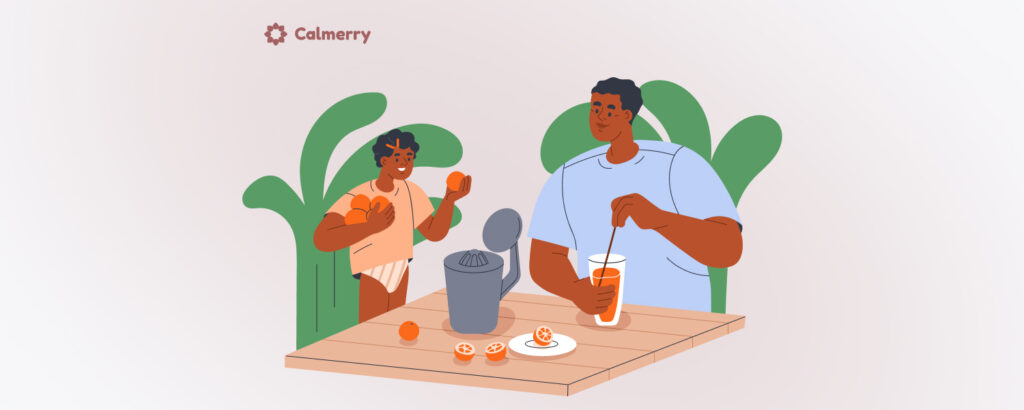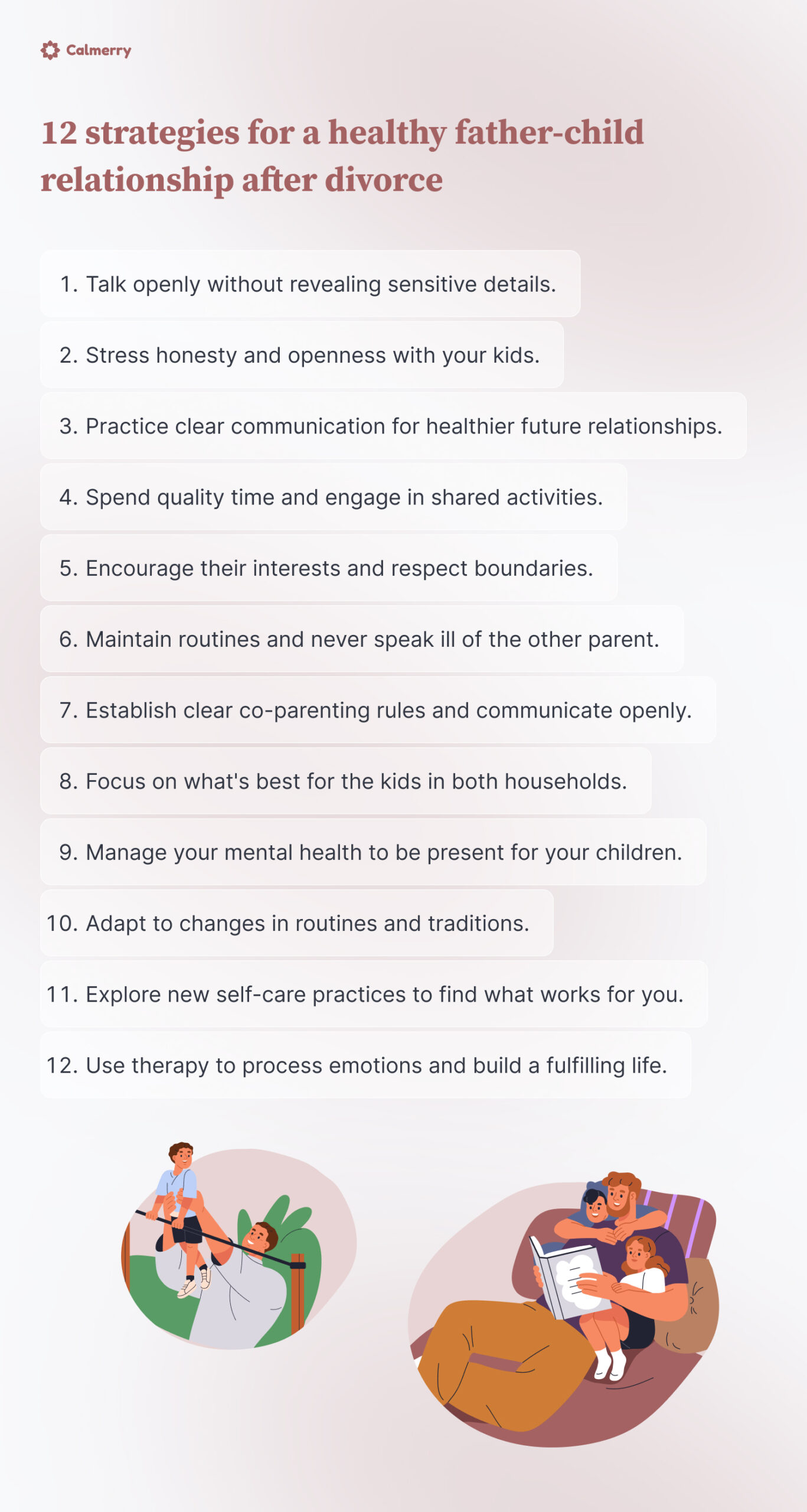Navigating Post-Divorce Father-Child Relationships with 6 Steps

In this article
Divorce complicates every family dynamic, even in the best circumstances. Fathers should maintain healthy relationships with their children to remain supporting, loving figures in their lives.
Here’s how to establish a post-divorce, father-child relationship that works best for you and your kids. When challenges arise, the work you put into your connection will help them withstand anything.
Understanding the impact of divorce on children
Children often have minimal say in the decisions shaping their lives. They might not notice or mind that part of being a child until their lives seemingly fall apart due to divorce. The family routines and relationships change without their input or approval.
These psychological challenges lead to lasting adverse effects if a child’s parents aren’t working to make the situation better for them.
Kids of any age growing up with divorced parents can experience these things long into adulthood:
- Depression
- Anxiety
- Low self-esteem
- Low self-sufficiency
- Substance use disorders [1] Miralles, P., Godoy, C. G., & Hidalgo, M. D. (2021). Long-term emotional consequences of parental alienation exposure in children of divorced parents: A systematic review. Current Psychology, 42(14), 12055–12069. https://doi.org/10.1007/s12144-021-02537-2
Kids may wonder if they played a role in the divorce or made things worse somehow. They can also feel powerless within the ongoing and sometimes turbulent change.
6 strategies for a healthy father-child relationship after divorce
Both parents can prevent these things from complicating how their divorce impacts their children, but fathers can help in specific ways.
Young people absorb gender roles through media and their social lives. They may associate dads with authority figures and moms with caretakers.
Fathers could mitigate the effects of divorce by maintaining a daily routine at home. Routines protect a child’s mental health in uncertain or scary times. [2] Glynn, L. M., Davis, E. L., Luby, J. L., Baram, T. Z., & Sandman, C. A. (2021). A predictable home environment may protect child mental health during the COVID-19 pandemic. Neurobiology of Stress, 14, 100291. https://doi.org/10.1016/j.ynstr.2020.100291
You could also lean into the masculine stereotype of the family protector. Verbalize how there’s nothing that could make you love your children less and nothing that could hurt them if you’re around. They may feel more secure with the reminders, leading to more peace of mind.

1. Establishing healthy communication
Children rarely know exactly why their parents divorce. They might not understand the complexities of financial hardships, unresolved trauma, or differences in communication.
Parents also might not want to hurt their kids further by revealing details like infidelity.
The post-divorce, father-child relationship should resolve the confusion or betrayal caused by the separation and divorce experience.
Although you might be unable to explain every detail that led to the marriage ending, you can stress the importance of honesty between yourself and your kids.
– Jack Shaw, Senior writer of the men’s lifestyle publication Modded
Take extra steps to show how you never hide anything from them by directly addressing whatever you can about the divorce.
Your kids will know they can ask questions or talk about the subject because it’s not off-limits. They’ll know they can discuss other challenging topics with you as they grow up because nothing makes you shut down or turn them away.
You’ll also get to practice communication skills as you become a single father. If or when you’re ready to search for a romantic partner again, you’ll create healthier relationships.
You’ll know how to feel your emotions before they explode, avoid parental alienation, placing blame or guilt-tripping, and listen to what someone says and feels.
2. Building a strong relationship
Relationships are ongoing work, which makes them rewarding. However, they won’t grow if there’s passive interest from one or both parties.
Create strategies to maintain a strong connection with your child as they grow up, like:
- Spending quality time together often
- Encouraging their interests and hobbies
- Maintaining a routine with shared activities
- Respecting your child’s boundaries
These efforts show your level of care and commitment. They also build a foundational sense of trust in an uncertain time for your child.
Many of these strategies also center on routine. You’ll establish new responsibilities and manage commitments with your kids to set the groundwork for a happy father-child relationship.
– Jack Shaw, Senior writer of the men’s lifestyle publication Modded
Consider taking these strategies further by never speaking badly about your former spouse while your child is around. They’ll respect you more if they know you don’t say negative things behind someone’s back.
3. Navigating co-parenting
Figuring out how to co-parent isn’t easy. You may not be on good speaking terms with your former spouse. Parenting styles could also be some of the most significant factors that led to your divorce.
Establishing basic co-parenting rules is crucial when living separately from your former partner.
Communicate what you don’t want for your kids, like unrestricted time with their electronics or life without a curfew. These will be the boundaries of your relationships with your kids. It’s easier for them if they can expect the same things in both parental households.
Your perception of yourself and your ex plays a significant role in how well ongoing parental communication goes with your former partner.
You’ll avoid hostility by accepting that co-parenting means no egos are allowed in the room while you discuss your children. Define the strengths you both bring to your kids’ lives to maintain significant connections with them.
– Jack Shaw, Senior writer of the men’s lifestyle publication Modded
Co-parenting also requires understanding your own mental health. You can’t stay calm, listen, and work together if you’re stressed, anxious, or severely depressed.
Talk with a therapist to work through the personal challenges left over from an unhappy marriage and life before your former spouse. You’ll feel more present as a father when your mental health is in a good place.
Legal considerations and rights
Co-parenting is rarely possible without a legal custody arrangement. Common custody agreements and visitation rights include situations such as:
- Joint custody with 50/50 schedules as determined by the parents
- Primary custody with supervised or nonsupervised visitation
- Sole custody to one parent with supervised, restricted, or no visitation
Several factors determine how these situations happen. If your divorce is amicable, you may get joint custody without any challenges.
A parent who’s less responsible or has a history of behaviors that could put the kids at risk might need to go through longer court proceedings to determine how safe the children are in their post-divorce household without the other parent.
State policies can also define custody arrangements differently. New York judges decide custody based on the child’s best interests, which includes factors like each parent’s caregiver skills, their mental health and illnesses.
Judges in Mississippi weigh the same factors in addition to a parent’s moral fitness and each parent’s job history. Your divorce lawyer can navigate you through these challenges based on where you live.
4. Dealing with new family dynamics
Interpersonal dynamics in your family don’t begin and end with conversations. They also rely on routines and traditions.
How will you handle the holidays with your former partner?
Are there special occasions your father-child relationships will depend on, like made-up family holidays or routine vacations?
Some of these dynamics might mean more to you based on your interests. You might fight more to retain your annual father-child camping trip rather than let your partner do it because they don’t care for the activity as much as you and your child.
As you live apart from your ex, you’ll create a new social life. Your kids will eventually meet your future friends and potential partners.
How will you introduce them?
When will your ex be comfortable with your children meeting your romantic interests?
You’ll figure out these things as you learn to be a single father. You don’t need all the answers before your divorce proceedings are through.
Remember to talk with your partner about your openness to learning together. If you trust each other to prioritize growing as co-parents instead of spouses, you’ll have an easier time as a single dad.
– Jack Shaw, Senior writer of the men’s lifestyle publication Modded
5. Maintaining self-care
Even the world’s best dads feel stressed about being solitary caregivers. Spending extended time with your kids as the only person in charge might lead to anxiety symptoms like heart palpitations, sweating, or feeling numb.
It’s challenging to stop your stress from getting between you and your kids. You could mean well, but the nervous system isn’t always easy to control.
Don’t let your children feel like they’re the cause of your anxiety. Establish self-care habits to be your best self as their dad.
Your post-divorce life could include journaling to reflect on your emotions, spending time with a therapist, practicing meditation, or establishing new boundaries.
Postpone time with your friends if you need to recharge your social battery before your kids visit. Eat healthier to feel your best while your little ones are in your home.
Self-care is different for everyone. Keep an open mind to trying new things. You’ll narrow down what works best for your mental health and more easily meet your family’s needs.
– Jack Shaw, Senior writer of the men’s lifestyle publication Modded
6. Seeking professional help
Men deal with more social stigma around emotional turbulence. Society rewards those who muscle through sadness and express anger or disinterest instead.
It could be why only 12.1% of American men sought therapy in 2021. [3] Statista. (2023, November 29). Mental health treatment or counseling among U.S. men 2002-2021. https://www.statista.com/statistics/673172/mental-health-treatment-counseling-past-year-us-men/
Avoiding your emotions holds you back. You won’t be able to connect with your kids on a deeper level or potentially understand the root causes of your divorce.
If you feel removed from your life, struggle to find a purpose as a single father, or need help sorting through your feelings, make an appointment with a therapist. They’re available in person and via online therapy.
Your health insurance may cover local therapy sessions, but sliding-scale appointments are available, too.
A licensed professional who works with you in a safe and supportive space will provide expert assistance to help you heal and grow.
Wrapping up
Creating a healthy relationship with your kids after a divorce takes time.
Give yourself grace as you learn how to live a post-divorce life. Work on your communication skills, become an active support system, and care for your mental health to build father-child relationships that prevent your kids from experiencing potential long-term adverse effects of your separation.
You got this!
A word from Calmerry
At Calmerry, we understand that navigating life as a single father post-divorce can feel overwhelming. The shift in family dynamics and the responsibility of managing new relationship patterns with your children can be challenging.
It’s okay to seek support during this transition.
We’re here to offer a helping hand. Whether through counseling to help you process your emotions and adapt to your new role or by providing strategies to strengthen your bond with your children, we have experienced mental health professionals who know how to help you.
Taking the step to engage in therapy can be a powerful act of self-care, not just for you – but as a model of resilience for your children.
Miralles, P., Godoy, C. G., & Hidalgo, M. D. (2021). Long-term emotional consequences of parental alienation exposure in children of divorced parents: A systematic review. Current Psychology, 42(14), 12055–12069. https://doi.org/10.1007/s12144-021-02537-2
Glynn, L. M., Davis, E. L., Luby, J. L., Baram, T. Z., & Sandman, C. A. (2021). A predictable home environment may protect child mental health during the COVID-19 pandemic. Neurobiology of Stress, 14, 100291. https://doi.org/10.1016/j.ynstr.2020.100291
Statista. (2023, November 29). Mental health treatment or counseling among U.S. men 2002-2021. https://www.statista.com/statistics/673172/mental-health-treatment-counseling-past-year-us-men/
online therapy
live video session



